It was bad about six months ago but the situation has now eased. Many for whom the State hospitals are the only recourse, however, are fearful when they would be given a prescription to pay and get not only basic drugs but also essentials from outside or be on that dreaded waiting list for surgery because the necessary devices are unavailable.
The Government has allocated the gargantuan sum of Rs. 12 billion for the purchase of drugs and consumables in the Budget while also setting aside another Rs. 4 billion for what is called 'local purchases' in the event of emergency supplies being needed or a sudden shortage arises.
Sri Lanka needs 1,500 varieties of drugs of which only about 50 are manufactured locally and 5,000 consumables including devices, stents and catheters, the Sunday Times understands. Around 282 are essential drugs.
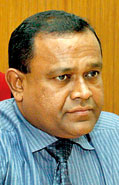 |
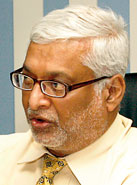 |
| MSD Director Dr. Kamal Jayasinghe |
SPC/SPMC Chairman
Prof. Jayaratne |
With such huge funding allocations, the Sunday Times turned the spotlight on how and why drug and consumable shortages do occur and what should be done to prevent them.
In a no-holds-barred interview, Prof. S.D. Jayaratne, the Chairman of both the State Pharmaceuticals Corporation (SPC) and the State Pharmaceutical Manufacturing Corporation (SPMC) spoke of the "multiple reasons" for such shortages and what plans are in the pipeline to overcome them.
Being the main procurement agency for all imported drugs and devices for Government hospitals and affiliated institutions, Prof. Jayaratne while conceding that drug shortages are a "constant issue" points his finger at quality failures.
Explaining that the Medical Supplies Division (MSD) compiles the requirements of the country's State hospitals and submits them to the SPC, he says that the SPC then calls for worldwide tenders to give all players an equal chance and get the lowest price for the country's requirements.
All those who submit tenders to supply drugs should mandatorily be registered with the Drug Regulatory Authority (DRA) of Sri Lanka, having met the conditions and criteria of the DRA, it is learnt.
Many Indian suppliers come up with the cheapest bid, according to Prof. Jayaratne and as such about 80-85% of Sri Lanka's imported drugs come from them.
Here lies the problem as well because many drugs produced in India are prone to quality failures. "This has been a persistent problem," says Prof. Jayaratne, detailing the aftermath of such quality failures.
The chain reaction is obvious - a quality failure is followed by a drug recall which, in turn, is followed by an inevitable drug shortage as the lengthy purchase procedure has to be repeated once again, it is learnt.
Referring to the reasons why quality failures come about, the SPC Chairman points out that when a tender is awarded, a pre-shipment sample of the drug ordered is requested and tested, either at the National Drug Quality Assurance Laboratory (NDQAL) or an accredited international laboratory.
The downside, however, is that sometimes this sample may be different in quality to the actual product.
In the case of a quality failure, the supplier is instructed to send replacement supplies but if it recurs in five batches of drugs, then the supplier is blacklisted for three years, after which the supplier has to go through the stringent process of re-registration with the DRA, he says. In some instances, however, blacklisting may not be the most viable option, since the number of companies producing and supplying a particular drug may be limited.
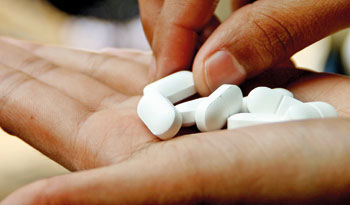 |
| Paracetamol tablets of which 48 million are needed monthly |
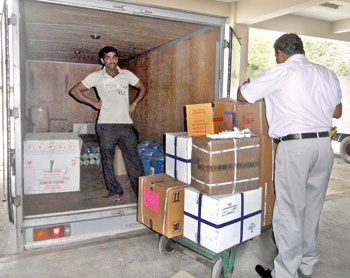 |
| Supplies taken out from the MSD for distribution |
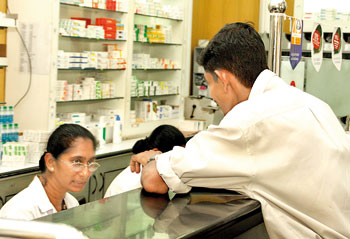 |
| An SPC outlet |
Suggesting ways and means of ensuring that good companies which would have no quality failures in their products are registered, Prof. Jayaratne says that factory inspections may help, even if a Sri Lankan team has to visit the location in another country.
He also urges the strengthening of supplier registration procedures depending on capacity and earlier supply records, etc. "If they realize that Sri Lanka is very stringent on the regulations, they will not take the risk of sending low quality drugs."
Another way that shortages occur, he says, is when companies fail to meet the requirements stipulated and there is a delay in the supply.
Turning the searchlight inward, Prof. Jayaratne also points out the flaws within the system internally. "The prediction of a shortage is poor as there is no methodical stock-check system in place. Hospital pharmacies are not computerized and networked," he says, stressing that an inter-linked computerized system is essential, a path that the MSD has just launched.
Storage is also causing many a headache to the authorities, the Sunday Times understands, along with the conditions, such as air-conditioning, under which certain drugs need to be transported as well as stored.
Standards should be stipulated, says Prof. Jayaratne, adding that air-conditioning of pharmacies should be made mandatory.
Another urgent need, he says, is the enhancement of the capacity of the NDQAL. Sometimes the capacity is not even adequate to test the pre-shipment samples while random post-market sample (off-the-shelf) checks are not carried out aggressively, he says, citing the example of Tamilnadu in India, where every batch is tested and evaluated.
Although setting up such laboratory facilities is expensive, he suggests that they are essential and a public-private coalition should be encouraged.
The conduit between the State hospitals and the SPC - the MSD - collects all the estimates of drugs required by the hospitals, compiles a full list and passes them on to the SPC, says MSD Director Dr. Kamal Jayasinghe. One issue, however, is that hospitals have to estimate their needs at least 15 months ahead for purchases to be on time.
Currently, the MSD is working on the drug needs for 2013, he says, explaining that such "lead time" hinders the hospitals taking into account the changes in disease patterns and also potential epidemics.
Another disadvantage would be, according to Dr. Jayasinghe, doctors being tied down to older varieties of drugs even though newer versions may be in the market.
Dealing with the magnitude of the drug requirements at State hospitals, he says 48 million tablets of paracetamol are the monthly need. If there is a quality failure in a bulk purchase, the whole system gets disrupted. Therefore, bulk requirements should be split among two or three registered companies.
Assuring that drug quality is tested by the NDQAL and the MSD does random checks in addition to checks based on complaints, Dr. Jayasinghe says that in case of an emergency shortage, the MSD has the authority to purchase a drug locally, by calling for tenders locally.
"These are known as 'local purchases'," he says, giving the example of the recent saline purchases. The danger though is that sometimes local producers may take advantage of the situation and quote higher prices,
Constant monitoring and stock checks are carried out by MSD officers to minimize drug deficits and reduce supply gaps, assures the MSD Director.
Looking at the weaknesses, Dr. Jayasinghe says the "lead time" of 15 months is too long and may tend to create a lapse in efficacy. Ideally it should be less thasn six months.
Echoing the views of the SPC Chairman, he says that certain Indian drugs are prone to quality failures and urges that more drugs should be manufactured locally.
When asked specifically about recent shortages of cardiac drugs, he added that the MSD went into contingency mode to meet that.
Committee to recommend purchase of medical devices the answer
Another concern in medical circles is the procurement of medical devices, the evaluation of which is done by individual specialists.
"This system is completely unsatisfactory," said a source, pointing an accusing finger at pharma companies which are known to "lure" specialists to their products by giving them economic incentives.
Often, specialists may present biased opinions, said the source, also pointing out that it is unfair to get specialists to do evaluations in their own time without being paid a cent.
Instead of asking one to conduct the evaluation, a Specialist Committee may be more appropriate, the source said, adding that individual favourite devices would not come into play then.
Producing enough drugs the way forward
With the dawn of the New Year and the implementation of the National Medicinal Drugs Policy will come action that will prevent drug shortages, the Sunday Times understands.
There will be a Central Authority in charge of drug procurement and related activities which will iron out ad hoc situations, assures SPC Chairman Prof. Jayaratne.
Another avenue that needs to be strengthened is the expansion of drug production within Sri Lanka itself, he says. Currently only about 63 drugs are produced here by eight companies which have limited capacity.
"If we can produce enough drugs to meet our needs, that would be the way forward," he says, pointing out the advantages of better quality, cost-effective drugs. It would also save the time wasted on tender procedures, help retain foreign exchange and boost employment. Local manufacturers should be encouraged with guarantees by the Government that their quality products would be bought by the authorities.
Sharing medical equipment to meet shortages
By Nadia Fazlulhaq
Heart surgeries were severely affected due to the shortage of devices at the National Hospital, the Sri Jayewardenepura General Hospital, the Lady Ridgeway Hospital for Children, the Kandy Teaching Hospital and the Karapitiya Teaching Hospital, said Dr. Upul Gunasekera of the Government Medical Officers' Association (GMOA).
In the National Hospital, where annually about 1,000 heart surgeries are performed, the waiting period per patient has increased to six months while the Kandy Cardiology Unit was closed for two months, he said.
Such shortages have also resulted in equipment having to be shared, he said, explaining that cardio units of many main hospitals including the Cardio Thoracic Unit of the National Hospital share oxygenator tubing sets that function as lungs during heart surgeries.
We extend support to the National Hospital, LRH and other hospitals if they face a shortage of medicines or devices, said Sri Jayewardenepura Hospital Director Dr. S.A.K. Gamage when contacted by the Sunday Times.
"Recently we had to purchase 10 Ephedrine Sulfate 30mg injections used for Caesarian sections," he said, explaining that usually though they cost about Rs.50 each, they had to bought for Rs.400 each from a pharmacy of a private hospital.
The Sunday Times learns that the Accident Service of the National Hospital uses its Local Purchase Fund in case of a shortage of sutures, needles or other surgical material, while Karapitiya Hospital Director Dr. Jayampathi Senanayake said the MSD had allocated Rs. 50,000 per day for the hospital to purchase medical items from the local market.
This is due to the MSD's tender procedure being time-consuming. We purchase the drugs through a Procurement Committee comprising myself, the specialist or physician recommending the drug and the chief pharmacist, he said.
Anuradhapura Hospital Director Dr. T.B. Wijekoon said no serious shortages were reported this year but as the Nephrology Unit is facing a shortage of dialysis equipment, such equipment was being borrowed from hospitals close by.
Meanwhile, Batticaloa Hospital Director Dr. K. Murugananthan said a considerable amount of drugs and devices are purchased locally. |






